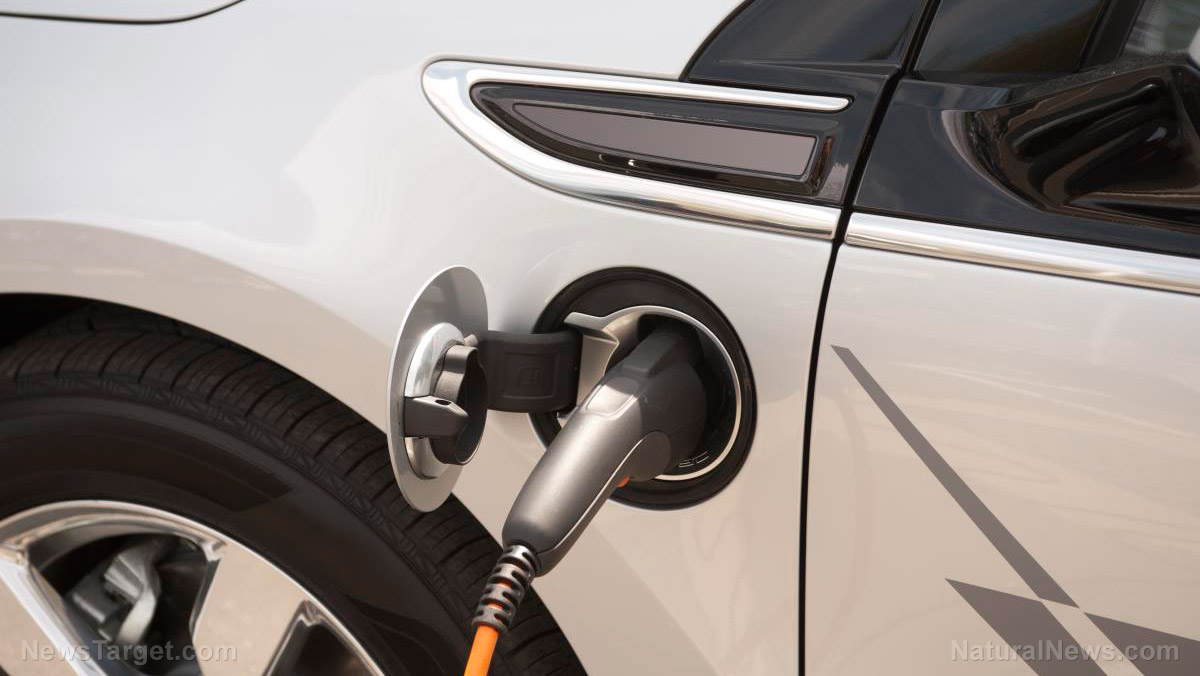Failed GREEN deal? Biden awards nearly $2B to carmakers to boost EV sales because almost nobody wants to buy them at fair market prices
07/18/2024 / By Belle Carter

President Joe Biden’s drive to force people to totally ditch fossil fuel-engine cars and switch to electric vehicles (EVs) for zero-emission is not going according to plan as demand for EVs continues to plummet. To salvage his failing green deal with the globalists, he is spending $1.7 billion in taxpayers’ money to modernize automobile manufacturing facilities in eight states.
Claiming to help the EV industry compete with foreign subsidies, save 15,000 jobs and create nearly 3,000 new positions, the current administration will extend grants to 11 selected manufacturing plants in eight states, including in Georgia, Michigan and Pennsylvania, that have temporarily closed or were at risk of closing. The money will be dedicated to retrofitting factories, installing equipment and bolstering annual production.
This will also allow at-risk facilities to convert to manufacturing electric vehicles, related components and a broad range of new-generation cars, such as fuel cell vehicles, hybrid cars and high-growth vehicle drive trains.
The federal funding for the move, which is a part of the Automotive Community Benefits Plan, will come from the Inflation Reduction Act, according to reports. Among those who will receive the grants are auto manufacturing giants including Fiat-Chrysler, which will be given $584 million; General Motors, $500 million; Harley Davidson, $89 million; and Volvo, $208.2 million.
“Building a clean energy economy can and should be a win-win for union autoworkers and automakers,” Biden said in a statement. “This investment will create thousands of good-paying, union manufacturing jobs and retain even more – from Lansing, Michigan to Fort Valley, Georgia – by helping auto companies retool, reboot and rehire in the same factories and communities.”
Human knowledge is under attack! Governments and powerful corporations are using censorship to wipe out humanity's knowledge base about nutrition, herbs, self-reliance, natural immunity, food production, preparedness and much more. We are preserving human knowledge using AI technology while building the infrastructure of human freedom. Speak freely without censorship at the new decentralized, blockchain-power Brighteon.io. Explore our free, downloadable generative AI tools at Brighteon.AI. Support our efforts to build the infrastructure of human freedom by shopping at HealthRangerStore.com, featuring lab-tested, certified organic, non-GMO foods and nutritional solutions.
The funding will complement the White House’s $177 billion investment in EV and battery manufacturing, Energy Secretary Jennifer Granholm said.
Moreover, top White House economist Lael Brainard explained that the investment is projected to generate $3.9 billion in total economic value and ensure that the United States keeps its climate goals intact. “We will not let our transition to clean energy be a zero-sum game where workers get left behind and where local plants close and move overseas,” Brainard said. “The president will not take his foot off the pedal when it comes to supporting the U.S. auto industry.” (Related: Op-ed: Biden administration’s “green energy” schemes AREN’T AS GREEN as they seem.)
Meanwhile, reports indicate that Biden has been courting auto workers since the weeks-long standoff between the United Auto Workers (UAW) union and the Big Three automakers – Ford Motor Co., General Motors and Stellantis – in September 2023. “He heard the call and stood up and showed up,” UAW President Shawn Fain lauded Biden as he spoke at a picket line in Michigan. “This November, we can stand up and elect someone who stands with us and supports our cause, or we can elect someone who will divide us and fight us every step of the way. That’s what this choice is about.”
Survey: Owners of EVs report 266 problems per 100 vehicles
A unique selling point for selling electric cars is that they would “save the planet from greenhouse gasses.” However, the most attractive value proposition is that they are convenient – they require less maintenance than traditional gas-powered vehicles, no oil changes, less gunk and fewer moving parts. But a recent poll revealed problems that overshadow these said benefits.
Data analytics and consumer intelligence company JD Power recently conducted a survey and found that people who own internal combustion engine (ICE) vehicles reported having 180 problems per 100 vehicles (PP100), while EV buyers have 266 PP100. According to the poll, the problems had little to do with the mechanics of EVs and almost entirely to do with the tech as they are essentially “giant computers on wheels.”
“Owners of cutting edge, tech-filled BEVs and PHEVs are experiencing problems that are of a severity level high enough for them to take their new vehicle into the dealership at a rate three times higher than that of gas-powered vehicle owners,” Frank Hanley, JD Power’s senior director of auto benchmarking, said in a statement.
Even Big Tech mogul Elon Musk’s Tesla, which typically performed better than legacy automaker’s EVs in past surveys, rated as poorly as the rest. JD Power attributes this to major design changes in Teslas, such as the removal of traditional feature controls like turn signal and wiper stalks.
The analytics firm also indicated that the major concern that came out of the study is that the auto industry is haphazardly racing to cram as much software into their models as possible. According to the report, customers get irritated about false rear-seat warnings and inaccurate and annoying alerts from advanced driver-assist systems, especially around new features like rear cross-traffic warnings and reverse automatic emergency braking. It has also listed that EVs had 30 percent more problems with “Features, Controls and Displays” than ICE vehicles.
“Customers most frequently experience difficulties connecting their phones to their vehicle or losing connection,” the findings further included. “More than 50 percent of Apple users and 42 percent of Samsung users access their respective feature every time they drive, illustrating that customers want their smartphone experience brought into the vehicle and also desire the feature to be integrated wirelessly.”
Head over to RoboCars.news to read stories related to electric vehicles’ disadvantages.
Sources for this article include:
Submit a correction >>
Tagged Under:
Automotive Community Benefits Plan, big government, Clean Energy, climate change, climate goals, electric cars, electric vehicles, environment, EV, Fiat Chrysler, GM Motors, government debt, Green New Deal, green tyranny, Harley-Davidson, Inflation Reduction Act, money supply, volvo, zero-emission
This article may contain statements that reflect the opinion of the author



















